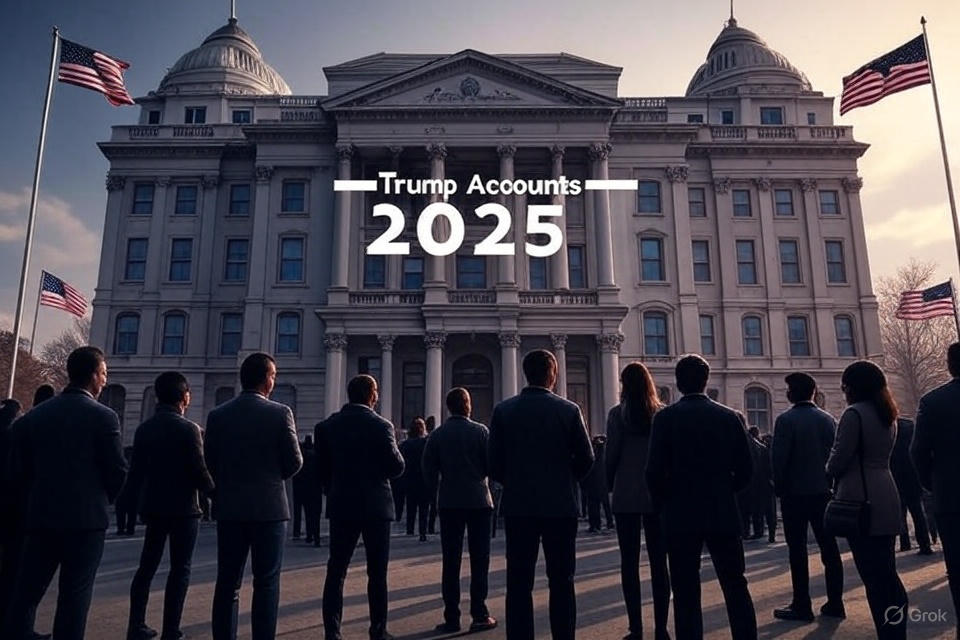Trump Accounts Social Security Privatization 2025: A Backdoor Threat or Economic Boost?

A new program offering $1,000 savings accounts for newborns, dubbed “Trump Accounts,” has ignited a firestorm of controversy after Treasury Secretary Scott Bessent called it a “back door for privatizing Social Security.” Enacted through the GOP’s sweeping One Big Beautiful Bill in July 2025, these accounts aim to boost financial literacy and wealth for future generations, but critics warn they could undermine a cornerstone of American retirement security, per The Washington Post. With Social Security’s trust fund projected to face insolvency by 2032, is this initiative a bold economic reform or a risky step toward dismantling a vital safety net? The Trump Accounts Social Security privatization 2025 debate is heating up, and the stakes couldn’t be higher.
The Trump Accounts: What They Are
Signed into law on July 4, 2025, as part of the One Big Beautiful Bill, the Trump Accounts program provides every U.S.-born child from 2025 to 2028 with a $1,000 government-funded savings account, per The Washington Post. Key details include:
- Structure: Accounts are tax-deferred, similar to IRAs, and track a U.S. stock index like the S&P 500. Families or employers can contribute up to $5,000 annually (adjusted for inflation post-2027) until the child turns 18, per Fox Business. Withdrawals, available in adulthood, are taxed at the long-term capital gains rate and can be used for education, a first home, or starting a business, per USA Today.
- Purpose: Promoted as a financial head start, the accounts aim to foster wealth-building and financial literacy, likened by Bessent to teaching a child to care for a pet, per The Washington Post. The White House claims they will “broaden and increase the savings and wealth of Americans,” per Newsweek.
- Cost and Scale: The Congressional Budget Office (CBO) estimates the program’s initial $1,000 deposits will cost $4 billion annually for four years, with potential growth to $100,000–$200,000 per account by retirement age, assuming 7% annual returns, per Urban-Brookings Tax Policy Center.
The program, inspired by Democratic proposals like Sen. Cory Booker’s “baby bonds,” enjoys broad public support, with 68% of Americans favoring it in a July 2025 Gallup poll, per CNN.
Bessent’s Bombshell and the Privatization Debate
At a Breitbart News forum on July 30, 2025, Treasury Secretary Scott Bessent sparked outrage by suggesting the Trump Accounts could “in a way” serve as a “back door for privatizing Social Security.” He argued that if accounts grow to “hundreds of thousands of dollars” by retirement, they could replace Social Security’s defined benefit plan, calling it a “game changer,” per The Washington Post. Hours later, Bessent backtracked, posting on X that the accounts “supplement the sanctity of Social Security’s guaranteed payments,” and the Treasury emphasized the program’s additive nature, per US News.
Democrats pounced, with Senate Minority Leader Chuck Schumer calling it a “stunning admission” of a GOP plan to privatize Social Security, per Newsday. Rep. Richard E. Neal (D-Mass.) warned that Republicans are pushing “Wall Street’s dream” to erode a program millions rely on, per The Washington Post. The controversy echoes the 2005 George W. Bush proposal for private Social Security accounts, which led to GOP losses in the 2006 midterms, per Detroit News.
The establishment narrative, pushed by the White House, frames the accounts as a pro-family, pro-growth measure, with Press Secretary Karoline Leavitt calling the bill’s passage a “VICTORY!” per CBS News. However, critics like Howard Gleckman of the Urban-Brookings Tax Policy Center argue the accounts, combined with a $6,000 senior deduction, hasten Social Security’s insolvency from 2033 to 2032, risking a 23% benefit cut, per The Washington Post. The Committee for a Responsible Federal Budget estimates the deduction alone reduces Social Security revenue by $30 billion annually, per CNN.
Additional Context: The One Big Beautiful Bill
The Trump Accounts are one part of the sprawling One Big Beautiful Bill, which passed with only Republican support after a 51-50 Senate vote (Vice President JD Vance breaking the tie) and a 218-214 House vote, per CBS News. Key provisions include:
- Tax Breaks: Extends Trump’s 2017 Tax Cuts and Jobs Act, eliminates taxes on tips and overtime, and raises the state and local tax (SALT) deduction cap from $10,000 to $40,000 (reverting to $10,000 after 2029), per BBC. A $6,000 senior deduction for those 65+ with incomes below $75,000 (individuals) or $150,000 (couples) benefits 88% of seniors, per White House.
- Spending: Allocates $9 billion for Arctic icebreakers, $12.5 billion for air traffic control modernization, and funds for border wall completion and ICE agents, per White House. It cuts $1.5 trillion in spending, including Medicaid and food assistance, per The Guardian.
- Deficit Impact: The CBO projects a $3.3 trillion deficit increase over 10 years, though the White House disputes this, claiming $2 trillion in savings from growth and cuts, per White House.
Social Security Administration Commissioner Frank Bisignano, a Wall Street veteran, denied privatization plans at his March 2025 confirmation, saying he’d “never heard a word of it,” per Newsday. Yet, Bessent’s comments suggest internal policy tensions, with analysts like Garrett Watson of the Tax Foundation calling the senior deduction a “short-term fix” that doesn’t address structural issues, per CBS News.
Critical Perspective: A Risky Bet?
The White House’s claim that Trump Accounts are purely additive ignores their potential to shift retirement planning from a government-guaranteed system to individual risk, per Washington Examiner. Privatization could expose retirees to market volatility, with a 2008-style crash potentially wiping out savings, as seen in 401(k) losses during the Great Recession, per Urban-Brookings Tax Policy Center. The program’s reliance on stock index funds also raises questions about Wall Street’s influence, with Bessent’s hedge fund background fueling skepticism, per Detroit News.
Conversely, supporters argue the accounts empower families, with potential for significant wealth accumulation. For example, $1,000 invested at birth with $5,000 annual contributions at 7% returns could yield $150,000–$200,000 by age 18, per Fox Business. Critics counter that low-income families may struggle to contribute, widening wealth gaps, per Center for American Progress. The bill’s failure to fully eliminate Social Security taxes, despite Trump’s campaign promise, further undermines its senior-focused claims, per PBS News.
Implications and Next Steps
- Social Security’s Future: The senior deduction and Trump Accounts could accelerate trust fund insolvency, requiring Congressional action by 2032 to avoid cuts, per CNN. Democrats vow to block privatization, with Rep. Brendan Boyle (D-Pa.) pledging to “fight like hell,” per Washington Examiner.
- Economic Impact: The accounts may boost financial literacy but risk over-reliance on markets, with 40% of Americans lacking $1,000 in savings for emergencies, per Federal Reserve. The program’s $16 billion cost over four years adds fiscal pressure, per CBO.
- Public Response: Stakeholders can voice concerns at ssa.gov or contact elected officials. Monitoring Treasury regulations, expected by July 2026, will clarify account implementation, per USA Today.
Conclusion
The Trump Accounts Social Security privatization 2025 controversy reveals a deeper clash over America’s retirement system. While the White House touts the One Big Beautiful Bill as a win for families and seniors, Bessent’s remarks expose a potential shift toward privatization, threatening Social Security’s stability. As Democrats rally to protect the program and analysts warn of fiscal risks, the debate over Trump Accounts will shape economic policy for years. Share your thoughts on this divisive plan below.










